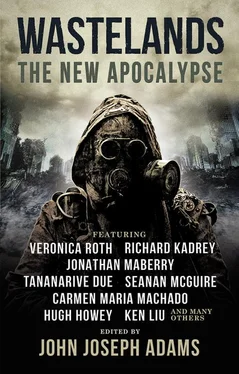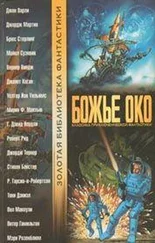“Do you really think so?” asked Kayn, who with this question became the last human being to ever care what a critic thought of his work.
The man in the battered top hat replied in the affirmative and placed himself on the conveyer belt into the orifice, surrendering his eternal fate to whatever it chose to make of him. On the other end lay the things that had been the other people on line: a lampshade, a golden helix, a blinking lizard, a globe, a puff of smoke, a parasol, a gasping fish, a mound of gray sand. Perhaps two or three of these things remained conscious of what they had been before their transformations. Perhaps two or three would survive after the city was gone. There was no way to predict, really. Submitting to the change might or might not be a better survival strategy than finding some secure place and waiting for the city to be engulfed. But this was the choice of those who found themselves on sinking ships: to stay, or to leave, either option equally promising, either option equally bad, the choice ultimately a lesson in philosophy. When that was the only thing left, the only weapon left was confidence.
Kayn was confident. For him, at least, it would not end this way.
In the meantime, he stood by as the penultimate man went through, and awaited his own turn.
NOT THIS WAR, NOT THIS WORLD
JONATHAN MABERRY
Jonathan Maberryis a New York Times bestselling author, five-time Bram Stoker Award winner, and comic book writer. His vampire apocalypse book series, V-Wars , is in production as a Netflix original series, starring Ian Somerhalder ( Lost, Vampire Diaries ) and will debut in early 2019. He writes in multiple genres including suspense, thriller, horror, science fiction, fantasy, and action; and he writes for adults, teens and middle grade. His works include the Joe Ledger thrillers, Glimpse , the Rot & Ruin series, the Dead of Night series, The Wolfman, X-Files Origins: Devil’s Advocate, Mars One , and many others. Several of his works are in development for film and TV. His comics include Black Panther, The Punisher , and Bad Blood . He is a board member of the Horror Writers Association and the president of the International Association of Media Tie-in Writers. Find him online at jonathanmaberry.com.
-1-
“This is Billy Trout reporting live from the apocalypse…”
The radio still worked. That was something.
As long as that kept working Sam thought there might be a chance. He didn’t believe in much. Didn’t really believe in that. But a guy has to hold onto something.
He held on.
-2-
Sam Imura leaned against the hard plastic wall of his elevated tree stand and carefully and quietly opened a can of beer. Doing it slowly to allow the gas to hiss very softly and to keep the metal from screeching. He pushed the tab down into the opening and folded the ring back. Nice and neat.
The beer was warm. A local brew that tasted almost, but not exactly, like piss. He drank piss once. Years ago during a week of hardship training at Fort Bragg. Anyone who complained about it got shipped back to whatever branch of service they came from. Sam sipped the beer, and revised his opinion. This stuff tasted every bit as bad as hot urine. He took another swallow and set the can down.
The deer stand was in a nice spot. Just inside a shadowy tree line. To either side and behind, he could see well into the woods, which rose in a series of small humps. Lots of trees, not too much shrubbery. Exposed roots, which made animals walk carefully and made two-legged targets trip. The other direction looked out on a big field that wandered up toward a farmhouse.
The house was empty, cleared out two nights ago. A smoldering mound of gristle and bone was humped in front of the porch. Three other mounds were situated around the property, including one by the blackened shell of a pickup truck that had blown itself up by an old gas pump. There was a story there, but Sam didn’t know what it was.
The house itself wanted to tell another story. From what he could see, a few people had tried to reinforce it, but fucked it all up. They nailed boards in a haphazard way across all the windows, but the nails had been driven straight in, not toe-nailed, not screwed. Nothing to give them real resistance. And someone had rigged the cellar door with crossbeams, but for some reason hadn’t hidden down there.
There was blood everywhere—and some shell casings.
From the mess in the yard Sam could tell that a wave of people had come through and cleaned out the leavings of the failed stronghold. Shell casings told him that it wasn’t military, though. Mostly pistol and hunting rifle rounds, some commercial shotgun shells, so he figured it was local hunters and maybe some cops. That made sense. There would be more of them, and this was rural Pennsylvania. Every goddamn person out here owned a couple of guns.
By the time Sam got here, though, the killing was done and the killers had moved on. He hoped they were the good guys. If there were any good guys left. He was cynical enough to have his doubts. While running with DELTA and later with the Department of Military Sciences, he’d seen a lot of the worst side of humanity. The tendency toward savagery. The kneejerk reaction to lash out in fear, and to grab in need.
He took another sip of beer, adjusted his billed cap to shade his eyes and studied the field. Nothing moved except what the wind pushed, but that didn’t mean anything. There was something out there.
At the very edge of his unaided visual range was his truck. Sitting in the middle of the road with a busted axle. When he’d driven out of here two days ago he got exactly three hundred yards. That was it. He knew it hadn’t been the road that killed the truck. It was them.
Them .
Bodies break and burst under the wheels of a big rig, but they are still made of bone, they still have mass. Sometimes he’d had to smash into crowds of them. Sometimes he’d driven over them. Bumping and thumping over dozens of bodies. Men. Women.
Children.
It was worse than driving down a rutted country road. He figured he cracked the axle punching through the last bunch. Maybe did something to the radiator and the engine. The truck was as dead as everything else around here.
Sam never considered abandoning it, though, because he’d spent the best part of a day using a forklift to load pallet after pallet of supplies into a semi. Food, water, camping gear, fuel oil, tents, tools. All the things he thought would be useful to any group of survivors he met.
So far, he had no one to share his supplies with, and no motivation to leave it behind. His plan—still a bit rough around the edges—was to secure the house and the area up to a mile in every direction. Kill anything that needed killing, and clear the way for survivors to come find him. There was a cemetery near here, and a town about seventeen miles away, in a town called Willard, but Sam couldn’t find it on a map or with the truck’s GPS. Useless as fuck.
So he stayed where he was.
The deer stand was already here, though old and in disrepair. He fixed it. Sam was always good with tools. Building things was as much therapy as it was a hobby. It had the precision that satisfied his sniper’s need for detail, and it made things instead of destroyed them. That mattered.
Killing was a constant in his life. He enlisted on his eighteenth birthday, choosing that path instead of following his father into law enforcement. His younger brother, Tom, was in the police academy in California. Sam wondered if any of his family was still alive. Maybe Tom. The kid was resourceful. Practical and tough. His dad was old and slowing down, though. Sam didn’t know a lot about his stepmom and had never seen his baby half-brother, Benny. They were three thousand miles away, high in the Sierra Nevada mountains of central California. Maybe this plague hadn’t reached that far.
Читать дальше


![Nick Cracknell - The Quiet Apocalypse [= Island Zero]](/books/28041/nick-cracknell-the-quiet-apocalypse-island-zero-thumb.webp)









